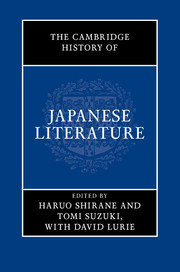Book contents
- The Cambridge History of Japanese Literature
- The Cambridge History of Japanese Literature
- Copyright page
- Contents
- Illustrations
- Contributors
- Book part
- A note on Romanization and conventions
- Glossary
- General introduction
- Part I The ancient period (beginnings to 794)
- Part II The Heian period (794–1185)
- Part III The medieval period (1185–1600)
- 21 Introduction to medieval literature
- 22 Japanese poetic thought, from earliest times to the thirteenth century
- 23 Shinkokin wakashū: The New Anthology of Ancient and Modern Japanese Poetry
- 24 Waka in the medieval period: patterns of practice and patronage
- 25 Hyakunin isshuand the popularization of classical poetry
- 26 Medieval recluse literature: Saigyō, Chōmei, and Kenkō
- 27 Medieval women’s diaries: fromTamakiwarutoTakemukigaki
- 28 Setsuwa (anecdotal) literature:Nihon ryōikitoKokon chomonjū
- 29 The rise of medieval warrior tales:Hōgen monogatariandHeiji monogatari
- 30 The Tales of the Heike
- 31 The late medieval warrior tales: fromSoga monogataritoTaiheiki
- 32 Literature of medieval Zen temples: Gozan (Five Mountains) and Ikkyū Sōjun
- 33 Renga (linked verse)
- 34 Noh drama
- 35 Noh drama theory from Zeami to Zenchiku
- 36 Kyōgen: comic plays that turn medieval society upside down
- 37 Late medieval popular fiction and narrated genres: otogizōshi, kōwakamai, sekkyō, and ko-jōruri
- Part IV The Edo period (1600–1867)
- Part V The modern period (1868 to present)
- Bibliography of English secondary sources and translations
- Index
34 - Noh drama
from Part III - The medieval period (1185–1600)
Published online by Cambridge University Press: 05 January 2016
- The Cambridge History of Japanese Literature
- The Cambridge History of Japanese Literature
- Copyright page
- Contents
- Illustrations
- Contributors
- Book part
- A note on Romanization and conventions
- Glossary
- General introduction
- Part I The ancient period (beginnings to 794)
- Part II The Heian period (794–1185)
- Part III The medieval period (1185–1600)
- 21 Introduction to medieval literature
- 22 Japanese poetic thought, from earliest times to the thirteenth century
- 23 Shinkokin wakashū: The New Anthology of Ancient and Modern Japanese Poetry
- 24 Waka in the medieval period: patterns of practice and patronage
- 25 Hyakunin isshuand the popularization of classical poetry
- 26 Medieval recluse literature: Saigyō, Chōmei, and Kenkō
- 27 Medieval women’s diaries: fromTamakiwarutoTakemukigaki
- 28 Setsuwa (anecdotal) literature:Nihon ryōikitoKokon chomonjū
- 29 The rise of medieval warrior tales:Hōgen monogatariandHeiji monogatari
- 30 The Tales of the Heike
- 31 The late medieval warrior tales: fromSoga monogataritoTaiheiki
- 32 Literature of medieval Zen temples: Gozan (Five Mountains) and Ikkyū Sōjun
- 33 Renga (linked verse)
- 34 Noh drama
- 35 Noh drama theory from Zeami to Zenchiku
- 36 Kyōgen: comic plays that turn medieval society upside down
- 37 Late medieval popular fiction and narrated genres: otogizōshi, kōwakamai, sekkyō, and ko-jōruri
- Part IV The Edo period (1600–1867)
- Part V The modern period (1868 to present)
- Bibliography of English secondary sources and translations
- Index
Summary
Keywords
- Type
- Chapter
- Information
- The Cambridge History of Japanese Literature , pp. 328 - 339Publisher: Cambridge University PressPrint publication year: 2015

